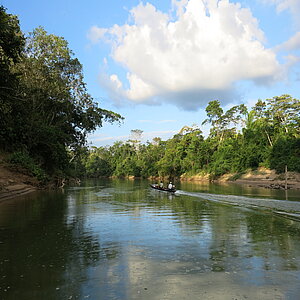Platform of indigenous peoples to address climate change

Peru has become the first country in the world to have an indigenous peoples' platform to address climate change.
Indigenous peoples are among the most vulnerable to the impacts of climate change due to their close relationship and dependence to their land, territories and natural resources. Peru reaffirms its commitment to work actively for the comprehensive management of climate change and recognizes the contribution of indigenous organizations by becoming the first country in the world to have a Platform of Indigenous Peoples to Address Climate Change (PPICC), putting it at the forefront of global climate action.
For the past two years, the country has been implementing the Framework Law on Climate Change, a multi-sectoral, multi-actor and multi-level effort that includes the participation of indigenous peoples. The need for an indigenous peoples' platform originated during a prior consultation carried out to approve the regulations for this law.
In the third quarter of 2020, the Ministry of Environment approved the formation and functions of the PPICC through a Ministerial Resolution and then installed the platform. The installation ceremony was attended by: Gabriel Quijandría, Deputy Minister of Strategic Development of Natural Resources of the Ministry of Environment; Ángela Acevedo, Deputy Minister of Interculturality of the Ministry of Culture; María Pía Molero, Deputy Minister of Women of the Ministry of Women and Vulnerable Populations; representatives of the seven national organizations of indigenous or native peoples; and representatives from public and private institutions.
Climate agenda with intercultural approaches
This initiative represents a milestone for the country, as the creation of this permanent space will serve to build a climate agenda with gender, intercultural and intergenerational approaches. In addition, this platform will serve to articulate, systematize, disseminate, manage and monitor proposals for adaptation and mitigation measures by indigenous or native peoples, taking into account ancestral knowledge and practices, as established in the Paris Agreement. The PPICC will have to present its proposals to the High-Level Commission on Climate Change (CANCC, by its Spanish initials), as well as recommendations on the incorporation of its knowledge, practices and ancestral wisdom into the comprehensive management of this climate phenomenon.
The aim is to develop an intercultural dialogue between the state and indigenous or native peoples in order to reach an agreement on the administrative measures proposed in the Regulation of the Framework Law on Climate Change. In this regard, the relevance of this platform is that all indigenous peoples can exchange knowledge and strengthen them in climate action. The PPICC will comprise of representatives of the seven Peruvian indigenous organizations recognized by the State, representatives of the Ministry of the Environment (MINAM) and the Ministry of Culture (MINCUL).
The Peruvian state reaffirms its commitment to strengthening intercultural dialogue in order to act against climate change. This initiative led by MINAM is supported by German development cooperation, implemented by the Deutsche Gesellschaft für Internationale Zusammenarbeit (GIZ) GmbH, through the IKI project ‘NDC Peru: Support to the implementation of the National Strategy for Climate Change’, on behalf of the German Federal Ministry for the Environment, Nature Conservation and Nuclear Safety (BMU).
The project provided technical assistance in methodological planning and organization of meetings for the creation and institutionalization of the platform. It also provided training in virtual tools to the members of the platform due to the new virtual context caused by the COVID-19 pandemic.
The link has been copied to the clipboard
Contact
IKI Office
Zukunft – Umwelt – Gesellschaft (ZUG) gGmbH
Stresemannstraße 69-71
10963 Berlin











![[Translate to English:] Amazonian River](/legacy/_processed_/6/c/csm_20210127_Amazonian_river_GIZ__Thomas_Miller_69f7b606b0.jpg)



